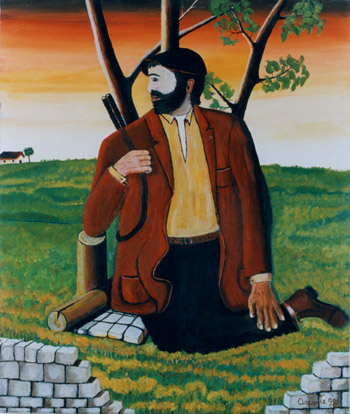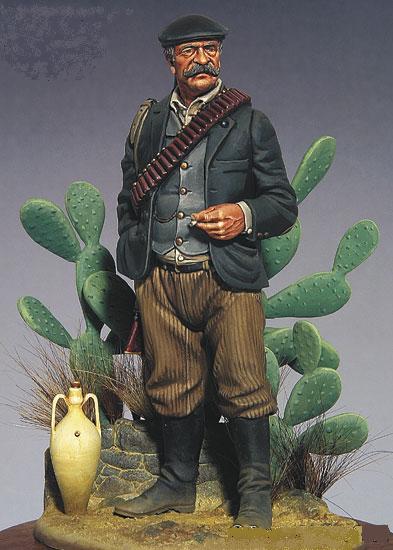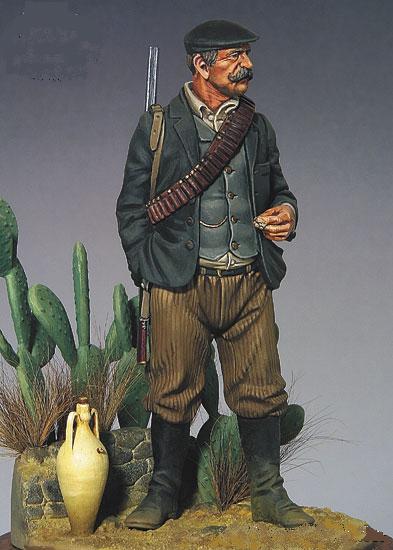Il Campiere

Sicilian armed field guard
Il Campiere

Sicilian armed field guard
In 1860, a young man named Giusseppe Garibaldi invaded the Kingdom of the Two Sicilies and conquered them with his army that became known as ‘The One Thousand’. No one expected him to win, his army was made up of mostly teenagers and very young men, far too young everyone believed. But win he did! With the assistance of some rebels hidden in the hills, Garibaldi accomplished the impossible! To this day, his victory is considered nothing short of a miracle and a testament to his courage and bravery.
Giusseppe Garibaldi became a true Italian hero.
The question that has to be asked is: How? How could Garibaldi achieve the impossible?
When Garibaldi landed at Marsala with his famous ‘Thousand’ on the 11 May, he found everything ready. Garibaldi had the power and influence of a fledgling group known as…the Campiere!
Before the incursion, Garibaldi saw Sicily as an ideal base to start the liberation and unification of Italy. To weaken the defenses of the Island Kingdom, Garibaldi sent his follower Francesco Crispi to foment a rebellion. On 11 May 1860, five weeks after the initial Sicilian rising, Garibaldi landed at Marsala with a thousand men and proclaimed himself dictator of Sicily, ruling on behalf of King Victor Emmanuel. A Venetian officer wrote: "The Sicilian revolution turns out to be little more than country bands…composed for the most part of notorious bandits who fight the government just as an excuse to fight the landowners."
But the real authority in rural Sicily was allowed to come into existence by the idleness and snobbery of the nobility, who lived mostly in Palermo to be near the Court. They were absentee landlords, unwilling or unable to manage their own estates, and therefore leaving a vacuum which was filled by the formation of a new class of ‘gabelloti’, or estate managers, to whom they rented their fiefs. The ‘gabelloto’ exploited the peasantry even more than the barons had done, asserting his new position with brute force and solving any complaint by habitual violence.
The ‘gabelloti’ in their turn recruited other personnel, naturally from among their kinsmen and friends. Their ‘uomo di fiducia’ (henchman, confidant) was the ‘soprastante’, who combined the functions of overseer and tax collector. He dealt directly with the peasants, with the assistance of the ‘campiere’, armed, mounted field-guards, watching over the animals, the crops, and above all the peasantry. The ‘campiere’ dressed and talked in a special way. Their violent methods were the main condition of their employment and made them ‘uomini di respettu’, ‘men of respect’, which in Sicily does not mean that they were respectable but that they commanded respect by terror and murder. By the time Garibaldi invaded Sicily, the Sicilian campiere was ready to join in his rebellion.
Through the combined efforts of Giusseppe Garibaldi, Giusseppe Mazzini, Count Camillo Cavour, and the Sicilian campiere, the Kingdom of the Two Sicilies fell. Italy, under the rule of King Victor Emmanuel, (except for the city of Rome), was one united republic.
In 1862, pressing
his success forward, Garibaldi attempted to take Rome and the Papacy, but
was driven back by the French forces of the Emperor of France that had
been summoned by the Papacy itself. It was not until September 20, 1870,
that Rome was finally taken by Italian forces. (Rome became the capitol
of Italy on 1 August 1871.)

